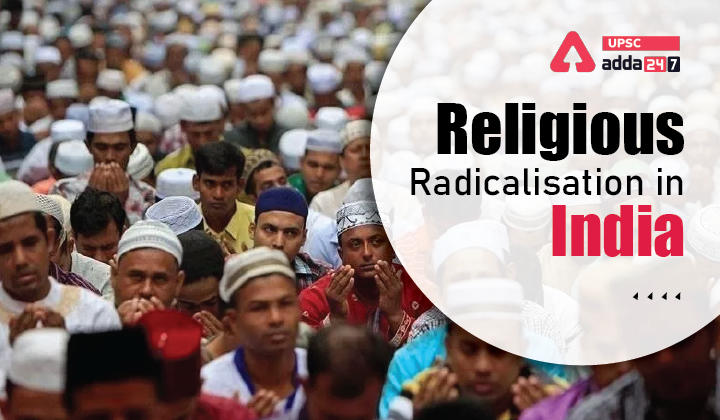Table of Contents
Religious Radicalisation in India: Relevance
- GS 2: Government policies and interventions for development in various sectors and issues arising out of their design and implementation.
Radicalisation in India: Context
- Radicalisation by the Global Terrorist Groups like ISIS, Al Qaida etc. is one of the most challenging problems faced by countries all over the world.
Religious radicalisation in India
- In the Indian context, some foreign agencies inimical to India along with Global Terrorist Groups have been making efforts to radicalise people.
About the religious radicals
- There are broadly three kinds of religious radicals in India.
- One, who believes in the dictatorship of the proletariat replacing multiparty democracy;
- Other who believes in the idea of a world ruled by Sharia;
- And the one who believes in the thought of India being a land primarily of Hindus, with others having lesser rights.
Government efforts to counter religious radicalisation
- Ensuring universal coverage of various Government welfare schemes without discrimination.
- Special schemes for un-served and underserved communities/areas.
- Promotion of composite culture and coexistence among various communities.
- Constitutional safeguards to minorities.
- Institutional efforts for ensuring fair representation of minorities and other less-represented communities in all spheres of life.
- There is an exclusive Ministry, viz. Ministry of Minority Affairs, for overall policy, coordination, evaluation and review of the regulatory and development programmes of the minority communities.
- Apart from the above, the Government has created a Counter Terrorism and Counter Radicalisation Division in the Ministry of Home Affairs to help and coordinate with various security and law enforcement agencies.
- Government of India has also proscribed a number of Organisations as terrorist organisation/unlawful association under the Unlawful Activities (Prevention) Act, 1967.
Read current affairs for UPSC





 TSPSC Group 1 Question Paper 2024, Downl...
TSPSC Group 1 Question Paper 2024, Downl...
 TSPSC Group 1 Answer key 2024 Out, Downl...
TSPSC Group 1 Answer key 2024 Out, Downl...
 UPSC Prelims 2024 Question Paper, Downlo...
UPSC Prelims 2024 Question Paper, Downlo...




